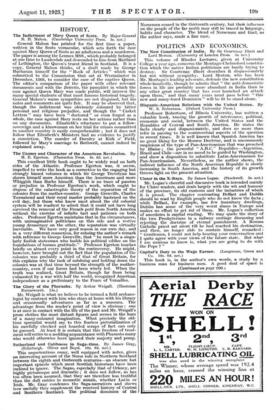The Causes and Character of the American Revolution. By H.
E. Egerton. (Clarendon Press. 8s. 6d. net.)
This excellent little book ought to be widely read on both sides of the Atlantic. Professor Egerton was, it seems, impelled to write the book as a corrective to the engaging but strongly biased volumes in which Sir George Trevelyan has shown himself more American than the Americans and more Whiggish than Burke himself. There is no trace of passion or prejudice in Professor Egerton's work, which ought to dispose of the catastrophic theory of the separation of the colonies from the mother-country. George Grenville, Charles Townshend and their royal master probably hastened on the evil day, but those who know most about the old colonial system will be readiest to admit that it could not have long survived the removal of the French peril from North America without the exercise of infinite tact and patience on both sides. Professor Egerton maintains that in the circumstances, with unimaginative politicians on this side and a restive young democracy on the other, the separation was virtually inevitable. We have very good reason in our own day, and in a very different connexion, for echoing the author's remark with reference to George Grenville, that echoing he must be a singu- larly foolish statesman who builds his political edifice on the foundations of human gratitude." Professor Egerton touches briefly on almost every point in the controversy. He might, however, have brought out the fact that the population of the colonies was probably a third of that of Great Britain, for this explains why the task of subduing and holding down the colonies was at that time beyond the strength of the mother- country, even if our forces had been wisely led. When the truth was realized, Great Britain, though far from being exhausted by a war with half the world, recognized American independence as a preliminary to the Peace of Versailles.


































 Previous page
Previous page